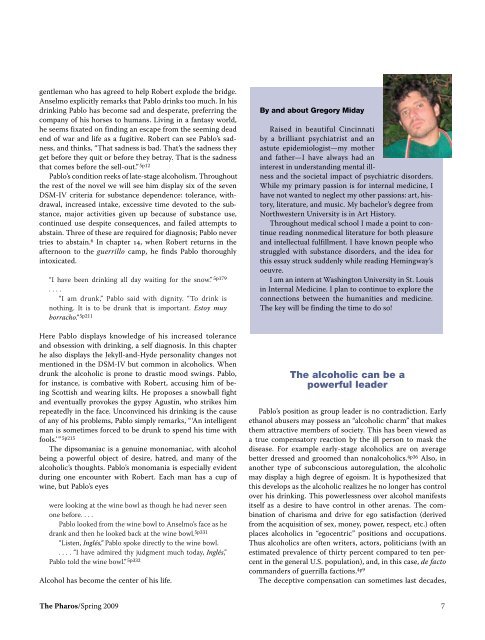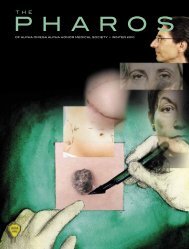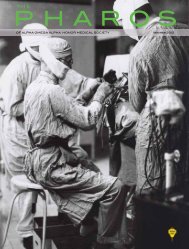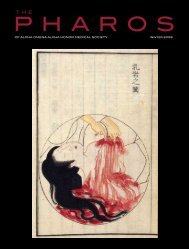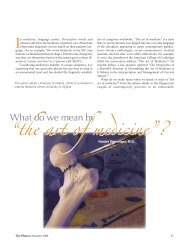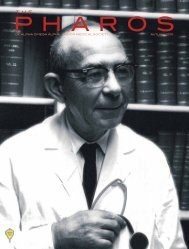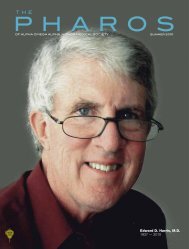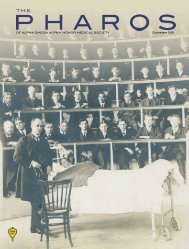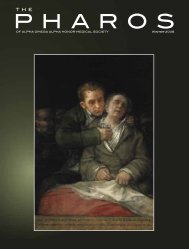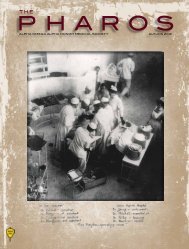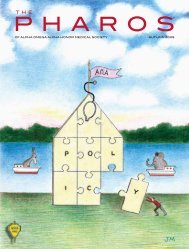4 - Alpha Omega Alpha
4 - Alpha Omega Alpha
4 - Alpha Omega Alpha
You also want an ePaper? Increase the reach of your titles
YUMPU automatically turns print PDFs into web optimized ePapers that Google loves.
gentleman who has agreed to help Robert explode the bridge.<br />
Anselmo explicitly remarks that Pablo drinks too much. In his<br />
drinking Pablo has become sad and desperate, preferring the<br />
company of his horses to humans. Living in a fantasy world,<br />
he seems fixated on finding an escape from the seeming dead<br />
end of war and life as a fugitive. Robert can see Pablo’s sadness,<br />
and thinks, “That sadness is bad. That’s the sadness they<br />
get before they quit or before they betray. That is the sadness<br />
that comes before the sell-out.” 5p12<br />
Pablo’s condition reeks of late-stage alcoholism. Throughout<br />
the rest of the novel we will see him display six of the seven<br />
DSM-IV criteria for substance dependence: tolerance, withdrawal,<br />
increased intake, excessive time devoted to the substance,<br />
major activities given up because of substance use,<br />
continued use despite consequences, and failed attempts to<br />
abstain. Three of these are required for diagnosis; Pablo never<br />
tries to abstain. 6 In chapter 14, when Robert returns in the<br />
afternoon to the guerrillo camp, he finds Pablo thoroughly<br />
intoxicated.<br />
“I have been drinking all day waiting for the snow.” 5p179<br />
. . . .<br />
“I am drunk,” Pablo said with dignity. “To drink is<br />
nothing. It is to be drunk that is important. Estoy muy<br />
borracho.” 5p211<br />
Here Pablo displays knowledge of his increased tolerance<br />
and obsession with drinking, a self diagnosis. In this chapter<br />
he also displays the Jekyll-and-Hyde personality changes not<br />
mentioned in the DSM-IV but common in alcoholics. When<br />
drunk the alcoholic is prone to drastic mood swings. Pablo,<br />
for instance, is combative with Robert, accusing him of being<br />
Scottish and wearing kilts. He proposes a snowball fight<br />
and eventually provokes the gypsy Agustín, who strikes him<br />
repeatedly in the face. Unconvinced his drinking is the cause<br />
of any of his problems, Pablo simply remarks, “ ‘An intelligent<br />
man is sometimes forced to be drunk to spend his time with<br />
fools.’ ” 5p215<br />
The dipsomaniac is a genuine monomaniac, with alcohol<br />
being a powerful object of desire, hatred, and many of the<br />
alcoholic’s thoughts. Pablo’s monomania is especially evident<br />
during one encounter with Robert. Each man has a cup of<br />
wine, but Pablo’s eyes<br />
were looking at the wine bowl as though he had never seen<br />
one before. . . .<br />
Pablo looked from the wine bowl to Anselmo’s face as he<br />
drank and then he looked back at the wine bowl. 5p331<br />
“Listen, Inglés,” Pablo spoke directly to the wine bowl.<br />
. . . . “I have admired thy judgment much today, Inglés,”<br />
Pablo told the wine bowl.” 5p332<br />
Alcohol has become the center of his life.<br />
By and about Gregory Miday<br />
Raised in beautiful Cincinnati<br />
by a brilliant psychiatrist and an<br />
astute epidemiologist—my mother<br />
and father—I have always had an<br />
interest in understanding mental illness<br />
and the societal impact of psychiatric disorders.<br />
While my primary passion is for internal medicine, I<br />
have not wanted to neglect my other passions: art, history,<br />
literature, and music. My bachelor’s degree from<br />
Northwestern University is in Art History.<br />
Throughout medical school I made a point to continue<br />
reading nonmedical literature for both pleasure<br />
and intellectual fulfillment. I have known people who<br />
struggled with substance disorders, and the idea for<br />
this essay struck suddenly while reading Hemingway’s<br />
oeuvre.<br />
I am an intern at Washington University in St. Louis<br />
in Internal Medicine. I plan to continue to explore the<br />
connections between the humanities and medicine.<br />
The key will be finding the time to do so!<br />
The alcoholic can be a<br />
powerful leader<br />
Pablo’s position as group leader is no contradiction. Early<br />
ethanol abusers may possess an “alcoholic charm” that makes<br />
them attractive members of society. This has been viewed as<br />
a true compensatory reaction by the ill person to mask the<br />
disease. For example early-stage alcoholics are on average<br />
better dressed and groomed than nonalcoholics. 4p36 Also, in<br />
another type of subconscious autoregulation, the alcoholic<br />
may display a high degree of egoism. It is hypothesized that<br />
this develops as the alcoholic realizes he no longer has control<br />
over his drinking. This powerlessness over alcohol manifests<br />
itself as a desire to have control in other arenas. The combination<br />
of charisma and drive for ego satisfaction (derived<br />
from the acquisition of sex, money, power, respect, etc.) often<br />
places alcoholics in “egocentric” positions and occupations.<br />
Thus alcoholics are often writers, actors, politicians (with an<br />
estimated prevalence of thirty percent compared to ten percent<br />
in the general U.S. population), and, in this case, de facto<br />
commanders of guerrilla factions. 4p9<br />
The deceptive compensation can sometimes last decades,<br />
The Pharos/Spring 2009 7


